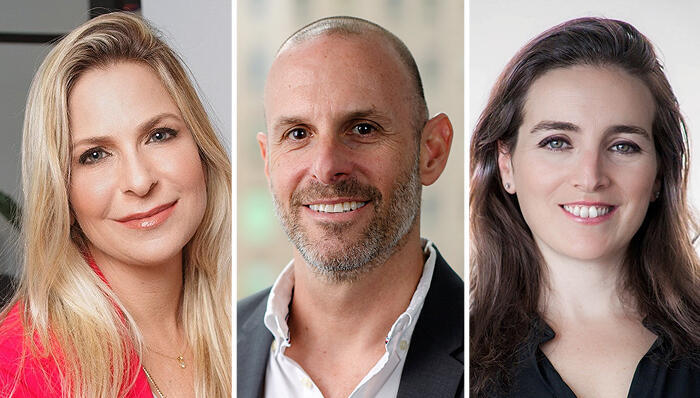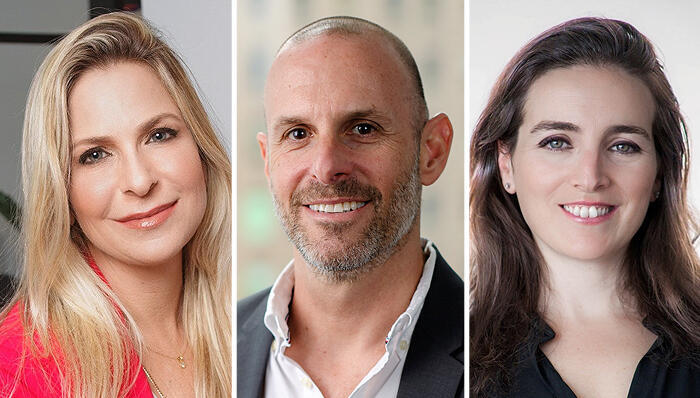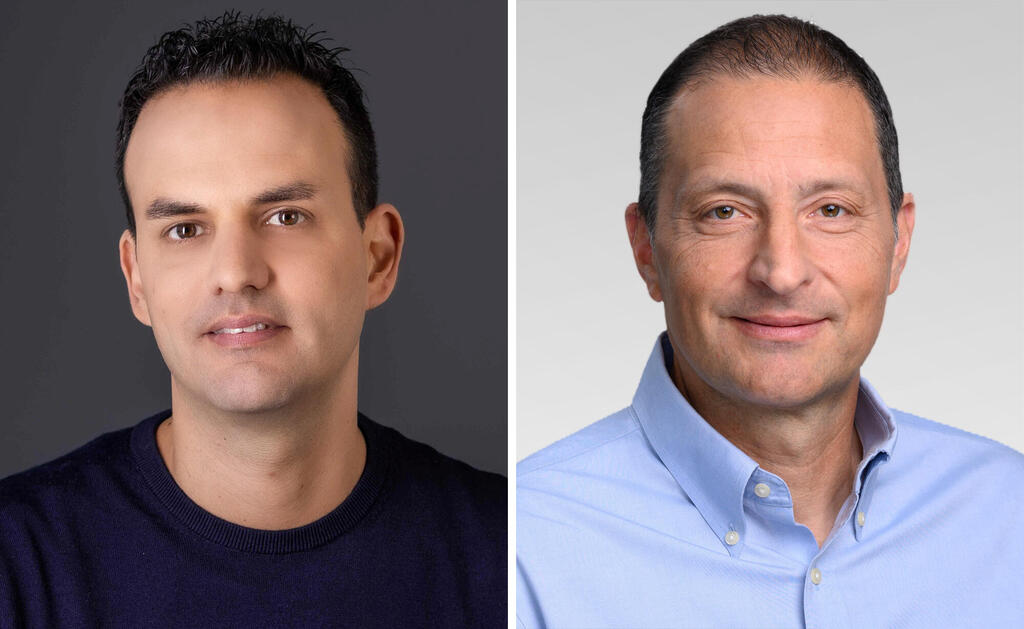
"Companies must be resilient to change"
Michal Kissos Hertzog, CEO of Poalim Tech, addressed the problems faced by entrepreneurs in the current period. Dr. Eldad Rom, psychologist, founder of Rom Business Psychology and partner in Team8 venture group, pointed to the difficulties entrepreneurs are facing with the new reality. A conversation about the challenges of the hour ahead of Calcalist and Poalim Tech's Roadshow event
"For many of today's tech entrepreneurs who entered the industry during its peak, this is the first real crisis they have ever witnessed. This situation has created a significant gap between their expectations and reality. They entered the tech world with astronomical ambitions, some even taking money from others to fulfill their personal dreams, expecting to get rich quickly, and suddenly, everything changed. This dissonance is very tough and has caused some very complex mental health challenges," said Dr. Eldad Rom, psychologist, founder of Rom Business Psychology and partner in Team8 venture group.
2 View gallery


Sivan Shamri Dahan, Dr. Eldad Rom and Michal Kissos Hertzog.
(Credit: PR, Scott Winger)
The financial crisis that started in 2022 is likely to continue well into 2024. While the U.S. is starting to see signs of recovery, uncertainty persists in Israel. Investment in Israeli tech has reached its lowest point in years, the outlandish valuations that startups once received from investors are a thing of the past, and the capital that companies built for themselves is rapidly shrinking as their funds run dry. Companies that can survive the coming months are those who successfully adapt to the situation, building both personal and business resilience. With the support of their investors, they will emerge stronger, more resilient, and better equipped for the future.
"The personal challenge for founders becomes even more complicated when you add the economic crisis, investor expectations, and hiring employees to the equation. Everyone expects them to continue behaving like superheroes, to exude joy and optimism, in order to attract more investors and hire more employees - all of which places them in a negative cycle that is difficult to break. Our role, both as investors and as psychologists, is to help them break free from these loops, to strengthen their resilience and reduce their stress," Rom said in an interview leading up to Calcalist’s Roadshow event in collaboration with Poalim Tech.
The Roadshow event, scheduled for November 21, 2023, will connect early-stage startups (pre-seed to Series A) with top investors in Israel, where entrepreneurs will have the opportunity for one-on-one meetings with leading VCs, mentorship and workshops to help them raise funds and deepen industry connections.
"Founders are human beings, and when they perceive a threat they bolster their defenses, which leads to denial. They portray a false sense of security and convince themselves that everything is fine. This only complicates and reinforces the loop they are already in, leading them to overreact and become more anxious. All of this exacerbates the problem even more. They put themselves down and are weakened as a result," said Dr. Rom.
"We are trying to help them deal with this psychological issue, to create a strong foundation that enables them to face the realities of life again. We encourage them to return to the basic question: 'Why are you doing what you’re doing?' I tell them not to compare themselves to what was before. Get back to what connected you to the tech world in the first place and don’t let anxiety scare you, because eventually it will fade. We are trying to strengthen their resilience by exposing them to challenging conditions, much like how a vaccine includes exposure to a low dose of bacteria to strengthen the immune system," said Dr. Rom.
How to build resilience
Michal Kissos Hertzog, CEO of Poalim Tech, also addressed the mental health issues facing entrepreneurs in the current period. "One of the most important and well-known tools during times of economic uncertainty is understanding that change is a constant. We’ve been in this environment for a long time now, and it doesn’t seem like it’s going to change soon. When companies internalize this reality, the next step is to build resilience in order to withstand constant change," she said.
“The question of how to create such resilience immediately causes me to reflect upon evolution, and the species that has solved this puzzle. The only creature that comes to mind are water bears, a microscopic animal capable of surviving under the most extreme conditions. How do we also develop such abilities? My feeling is that the main obstacle is psychological. In order to become more flexible and adaptive, breaking through entrenched perceptions is crucial.”
Kissos Hertzog notes that many founders are unable to do this, and continue operating based on valuations that are no longer relevant. “I completely understand. There is nothing more painful, but if we don't release ourselves from what was, you will reflect upon your once great company, that once had a fantastic valuation, but that no longer exists. It's hard because for most of us, fixating on the past is automatic. It is up to us to develop the ability to adapt and change.
"Research shows that companies that have emerged stronger from crises are those that were the quickest to adapt and adjust to new situations. Some of these companies not only survived but actually outperformed their competitors. As we enter the final quarter of 2023, it is worth learning from these historical lessons. While the current crisis may be different from earlier ones, the coping tactics are the same, whether you are a young startup or an established company.
“From a venture capital perspective, funding becomes more focused, concentrated, and selective when there is less money to invest. The level of risk also changes, making the process of selection and valuation more challenging, and this is also true for venture debt on the part of the banks. This situation poses an economic challenge on one hand, but also forces startups not to focus solely on growth at any cost, but on how their product and service differentiates and grows the company. In other words, startups build resilience by focusing on creating a competitive advantage while making changes and adjustments. The challenging economic environment forces them to do so," Kissos Hertzog explained.
Sivan Shamri Dahan, Managing Partner at Qumra Capital, said that the industry is being doubly impacted by both the global financial crisis and the local political crisis. "In normal years, over 1000 new companies would emerge annually, but today we have just over 400. This is certainly a worrying trend. A significant portion of these new startups are registered in the United States rather than Israel, and from Israel's perspective, this will result in damage for many years to come. An economic crisis compounded by domestic uncertainty due to the government’s judicial overhaul is driving away exceptional Israeli entrepreneurs and investors."
Practical financial tools
"Until the current crisis, the operating model for startups was growth at any cost," explains Omry Ben David, managing partner at Viola Ventures. "This would be fueled by frequent fundraising without regard to current profitability, or even future profitability. The situation today is that there is much more emphasis on profitability, on the relationship between growth and the cash burn rate, and profitability in terms of unit economics. The focus should be on a product with a value proposition that solves a real and painful problem in a large and significant market.”
"The earlier the round, the greater the weight of the team in the investment decision. At the seed round, the emphasis is about 75% on the team and its ability to develop a solution for a market failure to compete with existing and future competitors. The rest of the decision is based on the characteristics of the market, product/technological differentiation, and a sustainable business model. As we advance in the rounds, the expectation is to start seeing evidence for market, differentiation, and business performance," said Ben David.
According to Yuval Cohen, founder and managing partner of StageOne Ventures, "The best approach is to minimize expenses without stifling the company's growth. There are few cases where companies are close to profitability, and then it's possible to consider forgoing raising capital, but in most cases, companies are not profitable and to show growth, financial resources are required. It's also important to focus on revenue generation, not just cost-cutting. The idea is that in such a market, you need to strive for much faster income generation and not settle for pilot installations with customers."
From the perspective of funds investing in startups, Cohen said that "financial support is required as well as hard work in finding new investors and customers. We understand that during such times, continued investment is exactly what’s needed, so traditionally, we earmark about $2 for every dollar we initially invest."
In Cohen's view, the parameters he, as an investor, looks for in young startups have not been altered by the changes in the market. "We are still looking for a strong team (not necessarily experienced) developing a solution to an existing market problem. We always prefer entrepreneurs who develop their ideas based on previous market knowledge." Regarding what areas they are focused on investing in, Cohen said, "We have always invested in infrastructure products for B2B domains. For example, as one of the first funds to invest in Israeli cybersecurity and grow companies in the field to significant sales, we are currently looking very carefully at this field that has attracted a lot of investments but has become super competitive."
Ben David looks at the changes in the industry landscape from a different perspective: "I’ve read, for example, that Fintech has lost its importance in the Israeli ecosystem. I have an alternative explanation: naturally, with rising interest rates and the possibility of a recession, models for predicting debt repayment are unreliable, and there is less money invested. We believe that innovation in general, and AI in particular, will not give up on [Fintech]. At Viola, we continue to believe in and invest in Fintech and vertical solutions (health, real estate, music...), in liquidity and accessibility of financial products, as well as embedded solutions that transparently integrate financial tools for clients in various fields including mobile operators, retail, airlines, etc."
As someone who invests in growing companies, Shamri Dahan prefers to look less at the “spirit of the market," as she said. "We are people of numbers. Both in times of prosperity and now amid a recession, we don’t chase phenomena like quick term sheet signatures. Our investment processes are meticulous and will remain so. The challenge today is posed by the inflated valuations that companies received during the boom years. It puts us and the companies in a different position. Valuations have fallen, and therefore, investments have become more complex. A company that raised funding in its last round based on a billion dollar valuation, but today is realistically valued at half that will encounter difficulties, even if its product is excellent.
"I think young entrepreneurs have a lot to learn from the assessments of more mature entrepreneurs in advanced companies. The best advice is to always be cautious in your self-assessment and market assessment, even in times of prosperity," said Shamri Dahan. "First and foremost, focus on the core of your business and invest in it. Don't spread yourself too thin with additional development that may or may not succeed in the market. If you have a good product-market fit, focus on it. Don't expand your workforce too quickly, and certainly don't spend unnecessarily."
Dos and don’ts
In the spirit of the Roadshow event, we asked investors to offer some advice for early-stage entrepreneurs. Yuval Cohen said, "Assuming that most of your competitors are talented individuals like yourselves, my recommendation is to persist and persevere even when the situation sometimes seems hopeless. Regarding 'don'ts,’ I would suggest not starting a company in a field you aren’t an expert in just because it's a trendy area with a lot of interest."
"If you’re a talented team with a unique product idea that solves a real and painful problem in a substantial market that you’re familiar with, go out and raise funds. We’re waiting for you,” said Ben David. “On the 'don'ts' side, assume that if you can build an impressive MVP within a month or two on top of OpenAI, other startups can too. The existing players, who already have data and customers, are focusing on AI, with a built-in competitive advantage. Build a product and/or other assets that are difficult to replicate and will give you a significant advantage in the long run."
Shamri Dahan said “We recommend that entrepreneurs check the company's runway, even in good times, not only during crises. Always look at market trends and observe what your competitors are doing, and if you need to pivot, the time is now - don't wait. For young entrepreneurs, don't rush fundraising if you can avoid it. In the meantime, develop the product, build the company, and start selling. When better days come, then go for fundraising."
Kissos Hertzog said, "I recommend that entrepreneurs work on their ability to make quick decisions regarding changes and adjustments. It may sound simple, but it's not. It requires difficult concessions and unwavering discipline. When operating in an economically uncertain environment, it can be even more challenging.”














